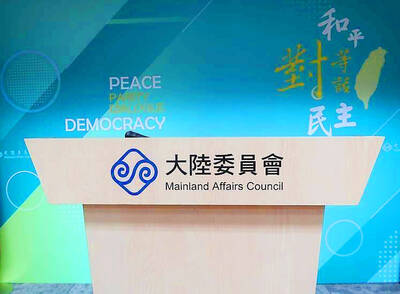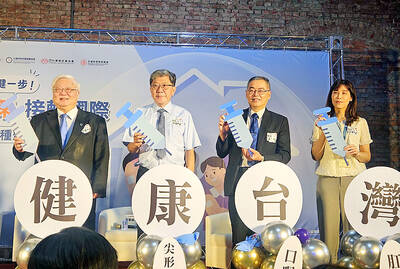The dollar slumped to 14-year lows against the yen yesterday, prompting expressions of alarm from Japan’s government as it battles to coax the world’s No. 2 economy back to health.
Japanese Finance Minister Hirohisa Fujii said the government was being “vigilant” and would take appropriate measures if currency rates “move abnormally” — although traders played down prospects for official intervention.
The greenback briefly dropped to ¥86.28, its lowest level since it traded at ¥84.92 on July 7, 1995. A stronger yen threatens the competitiveness of Japanese exporters just as the economy is slowly pulling out of a deep slump.
The dollar’s fall was driven by expectations that the US Federal Reserve will maintain its ultra-low interest rates for some time, sending investors in search of other higher-yielding assets, dealers said.
The US unit fell to a 15-month low against a basket of currencies including the euro, yen, pound and the Swiss franc. Its slide prompted gold prices to shoot up to record highs above US$1,195 an ounce.
The dollar’s woes have been exacerbated since Fed minutes on Tuesday indicated no change ahead for the low-rate regime and called the currency’s recent decline “orderly.”
“This yen strengthening is caused by dollar selling rather than yen buying, so this is not something Japan can handle by itself,” Mizuho Securities senior technical analyst Yutaka Miura said. “This trend will continue unless the Japanese government takes action, in cooperation with the US.”
The dollar’s fall sparked some speculation among traders that Tokyo may step into currency markets for the first time since 2004 to curb the yen’s ascent and so help Japanese exporting companies.
But most market watchers did not see Fujii’s remarks as suggesting that intervention was immediately on the horizon.
“Fujii’s comments highlighted the possibility of intervention on any further sharp falls, say below ¥85,” Satoshi Tate, senior vice president in the forex division of Mizuho Corporate Bank, told Dow Jones Newswires. “But at the same time, the comments did not convey a sense of real urgency, since they were essentially a repetition of the government’s typical line.”
Sumitomo Trust & Bank forex strategist Jitsuo Tachibana said: “Japan is unlikely to intervene in markets on its own, and would need to consult with other central banks in the world.”
A government minister and the bosses of two of Japan’s biggest business electronics groups expressed concern the stronger yen would hurt the export-led economy’s recovery from its worst post-war recession.
“The yen’s abrupt surge could have negative effects on the Japanese economy. I’m worried,” said Shizuka Kamei, the minister in charge of financial services.
Toshiba president Norio Sasaki said: “We would like coordination among governments to tackle rapid [currency] movements.”
Panasonic president Fumio Otsubo said: “We fear an underlying strong-yen direction in markets, and we are in an unpredictable situation.”

A Chinese aircraft carrier group entered Japan’s economic waters over the weekend, before exiting to conduct drills involving fighter jets, the Japanese Ministry of Defense said yesterday. The Liaoning aircraft carrier, two missile destroyers and one fast combat supply ship sailed about 300km southwest of Japan’s easternmost island of Minamitori on Saturday, a ministry statement said. It was the first time a Chinese aircraft carrier had entered that part of Japan’s exclusive economic zone (EEZ), a ministry spokesman said. “We think the Chinese military is trying to improve its operational capability and ability to conduct operations in distant areas,” the spokesman said. China’s growing

BUILDUP: US General Dan Caine said Chinese military maneuvers are not routine exercises, but instead are ‘rehearsals for a forced unification’ with Taiwan China poses an increasingly aggressive threat to the US and deterring Beijing is the Pentagon’s top regional priority amid its rapid military buildup and invasion drills near Taiwan, US Secretary of Defense Pete Hegseth said on Tuesday. “Our pacing threat is communist China,” Hegseth told the US House of Representatives Appropriations Subcommittee on Defense during an oversight hearing with US General Dan Caine, chairman of the Joint Chiefs of Staff. “Beijing is preparing for war in the Indo-Pacific as part of its broader strategy to dominate that region and then the world,” Hegseth said, adding that if it succeeds, it could derail

COMPLIANCE: The SEF has helped more than 3,900 Chinese verify documents, indicating that most of those affected are willing to cooperate, the MAC said More than 3,100 spouses from China have submitted proof of renunciation of their Chinese household registration, the Mainland Affairs Council (MAC) said yesterday. The National Immigration Agency has since April issued notices to spouses to submit proof that they had renounced their Chinese household registration on or before June 30 or their Taiwanese household registration would be revoked. People having difficulties obtaining such a document can request an extension of the deadline or submit a written affidavit in lieu of it. The council said it would hold a briefing at 2:30pm on Friday at the immigration agency’s Taichung office in cooperation with the

The government-funded human papillomavirus (HPV) vaccination is to be expanded to boys at junior-high school starting in September, the Health Promotion Administration (HPA) said yesterday. The Taiwan Society of Otorhinolaryngology, Head and Neck Surgery, the Taiwan Association of Obstetrics and Gynecology, the Taiwan Immunization Vision and Strategy, the Infectious Diseases Society of Taiwan, the Taiwan Head and Neck Society, the Formosa Cancer Foundation and the National Alliance of Presidents of Parents Associations held a joint news conference in Taipei yesterday to raise public awareness about the risks of HPV infection, regardless of gender. Invited to give an address, HPA Director-General Wu Chao-chun